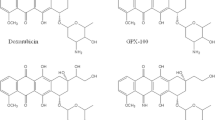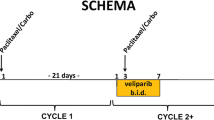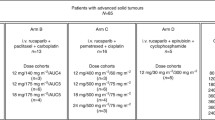Summary
Purpose To assess the safety, maximum-tolerated dose (MTD), and dose-limiting toxicities (DLT), of motexafin gadolinium (MGd), given in combination with doxorubicin, in patients with advanced solid tumors. Study Design The combination of MGd and doxorubicin was administered every 28 days (cycle 1) and then every 21 days (subsequent cycles). The dose of MGd, given daily for 3 days, was escalated from 1.0 mg/kg/d to 3.3 mg/kg/d, while the dose of doxorubicin was held at 30 mg/m2. Results Fifteen patients received 37 cycles of treatment, for a median of 2 cycles per patient (range 0–6 cycles). Three patients (20%) completed 6 cycles of therapy. The MTD was identified as MGd, 2 mg/kg/day and doxorubicin, 30 mg/m2. Dose limiting toxicities included grade 3 hypertension, pneumonia, bacteremia, and elevated GGT. Serious adverse events also included pulmonary embolism and urinary tract infection requiring hospitalization. There was no exacerbation of cardiac toxicity. No patients attained a response to treatment. Six patients (54%) had stable disease. The median time to disease progression, or to last assessment, was 49 days (range 8–195 days). Conclusions The combination of MGd and doxorubicin was fairly well tolerated. However, due to emerging preclinical data suggesting that MGd inhibits ribonucleotide reductase, further development of the combination of MGd plus doxorubicin is not recommended.

Similar content being viewed by others
References
Renschler MF (2004) The emerging role of reactive oxygen species in cancer therapy. Eur J Cancer 40:1934–1940
Evens AM (2004) Motexafin gadolinium: a redox-active tumor selective agent for the treatment of cancer. Curr Opin Oncol 16:576–580
Engel RH, Evens AM (2006) Oxidative stress and apoptosis: a new treatment paradigm in cancer. Front Biosci 11:300–312
Magda D, Miller RA (2006) Motexafin gadolinium: a novel redox active drug for cancer therapy. Semin Cancer Biol 16:466–476
Magda D, Lecane P, Miller RA, Lepp C, Miles D, Mesfin M, Biaglow JE, Ho VV, Chawannakul D, Nagpal S, Karaman MW, Hacia JG (2005) Motexafin gadolinium disrupts zinc metabolism in human cancer cell lines. Cancer Res 65:3837–3845
Hashemy SI, Ungerstedt JS, Zahedi Avval F, Holmgren A (2006) Motexafin gadolinium, a tumor-selective drug targeting thioredoxin reductase and ribonucleotide reductase. J Biol Chem 281:10691–10697
Zahedi Avval F, Berndt C, Pramanik A, Holmgren A (2009) Mechanism of inhibition of ribonucleotide reductase with motexafin gadolinium (MGd). Biochem Biophys Res Commun 379:775–779
Miller RA, Woodburn KW, Fan Q, Lee I, Miles D, Duran G, Sikic B, Magda D (2001) Motexafin gadolinium: a redox active drug that enhances the efficacy of bleomycin and doxorubicin. Clin Cancer Res 7:3215–3221
Donnelly ET, Liu Y, Paul TK, Rockwell S (2005) Effects of motexafin gadolinium on DNA damage and X-ray-induced DNA damage repair, as assessed by the comet assay. Int J Radiat Oncol Biol Phys 62:1176–1186
Evens AM, Lecane P, Magda D, Prachand S, Singhal S, Nelson J, Miller RA, Gartenhaus RB, Gordon LI (2005) Motexafin gadolinium generates reactive oxygen species and induces apoptosis in sensitive and highly resistant multiple myeloma cells. Blood 105:1265–1273
Carde P, Timmerman R, Mehta MP, Koprowski CD, Ford J, Tishler RB, Miles D, Miller RA, Renschler MF (2001) Multicenter phase Ib/II trial of the radiation enhancer motexafin gadolinium in patients with brain metastases. J Clin Oncol 19:2074–2083
Mehta MP, Shapiro WR, Phan SC, Gervais R, Carrie C, Chabot P, Patchell RA, Glantz MJ, Recht L, Langer C, Sur RK, Roa WH, Mahe MA, Fortin A, Nieder C, Meyers CA, Smith JA, Miller RA, Renschler MF (2009) Motexafin gadolinium combined with prompt whole brain radiotherapy prolongs time to neurologic progression in non-small-cell lung cancer patients with brain metastases: results of a phase III trial. Int J Radiat Oncol Biol Phys 73:1069–1076
Mehta MP, Rodrigus P, Terhaard CHJ, Rao A, Suh J, Roa W, Souhami L, Bezjak A, Leibenhaut M, Komaki R, Schultz C, Timmerman R, Curran W, Smith J, Phan S-C, Miller RA, Renschler MF (2003) Survival and neurologic outcomes in a randomized trial of maotexafin gadolinium and whole-brain radiation therapy in brain metastases. J Clin Oncol 21:2529–2536
Hasinoff BB, Davey JP (1988) Adriamycin and its iron(III) and copper(II) complexes. Glutathione-induced dissociation; cytochrome c oxidase inactivation and protection; binding to cardiolipin. Biochem Pharmacol 37:3663–3669
Braunschweiger PG, Schenken LL, Schiffer LM (1980) Adriamycin-induced delayed erythropoietic injury expressed following anemia stress. Cancer Res 40:2257–2262
Wang X, Zhenchuk A, Wiman KG, Albertioni F (2009) Regulation of p53R2 and its role as potential target for cancer therapy. Cancer Lett 276:1–7
Acknowlegements
The authors acknowledge our patients, their families, and our clinic and research staff in the completion of this trial. The authors would like to thank Minesh P. Mehta, MBChB, for his thoughtful review of this manuscript. Melinda Baker assisted with preparation of this manuscript.
Financial and Grant Support
Pharmacyclics, Incorporated, Sunnyvale, CA
Author information
Authors and Affiliations
Corresponding author
Rights and permissions
About this article
Cite this article
Traynor, A.M., Thomas, J.P., Ramanathan, R.K. et al. Phase I trial of motexafin gadolinium and doxorubicin in the treatment of advanced malignancies. Invest New Drugs 29, 316–322 (2011). https://doi.org/10.1007/s10637-009-9364-z
Received:
Accepted:
Published:
Issue Date:
DOI: https://doi.org/10.1007/s10637-009-9364-z




